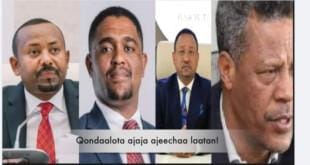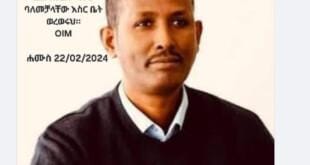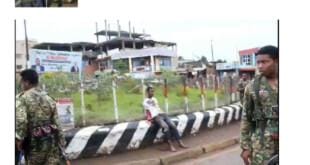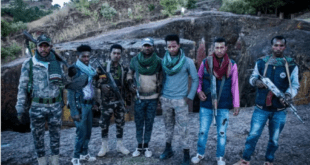By Barroo Goobee
December 7, 2017
Tigrayan People’s Liberation Front (TPLF) formed Oromo People’s Democratic Organization (OPDO) in 1990 from Oromo- speaking prisoners of war of the Derg’s regular army to undermine the genuine Oromo liberation fronts and to circumvent the aspiration of the Oromo people for independence. For the last twenty- seven years, the relation between TPLF and OPDO has been that of a master and a servant, more precisely that of a puppeteer and a puppet. Just as the puppeteer manipulates the puppet to make the audience believes the puppet is imbued with life, TPLF manipulated OPDO to deceive the Oromo people that OPDO is a democratic and a legitimate representative of the Oromo people.
In contrast, OPDO is neither a democratic nor a legitimate representative of the Oromo people. In short, it is as much an illegitimate organization as TPLF is. Its legitimacy is rejected by the Oromo people as evidenced by the popular queerroo (youth) uprising calling for the removal of Wayyaane, which means dismantling of the Ethiopian People’s Revolutionary Democratic Front (EPRDF) that include OPDO.
Despite this, there is a concerted effort by some vociferous Oromo activists in the diaspora to legitimize OPDO as the champion of the Oromo people. To this end, the activists have been busy glorifying key OPDO figures such as Abbaa Duulaa Gammadaa and Lama Megara with the expectation that the glory of these two men might rub off on OPDO and win them acceptance and support of the Oromo people. This effort gained momentum notably after the purported resignation of Abbaa Doula Gammadaa, from the Speaker of the Ethiopian House of Peoples’ Representatives reportedly to protest “disrespect” and an attack on the “dignity of Oromo people.”
Following the news of the resignation, some of the diaspora activist even bragged about having prior knowledge of the resignation though they did not disclose how they were privy to inside information. What is more, in their euphoric state over the speaker’s resignation, this cohort of diaspora activist heaped an accolade of praises on Abbaa Duulaa Gammadaa to the extent of exalting him to superhuman character akin to Hercules-a mythical Greek hero renowned for his great strength and especially for performing 12 labors imposed on him by Hera.
Here are samples of accolade praises on Abbaa Duulaa Gammadaa:
- That Abbaa Duulaa is a man of exceptional strength and physique.
- That he was the only EPRDF soldier to cross a raging river that sweep even a military
Vehicle.
Liberation Front is.”
- That he is fearless.
- That he is a strategic and decisive leader.
- That he is a populist leader.
- That he institutionalized the government of Oromia and so on.
Furthermore, the group has also expressed similar adulation of Lammaa Magarsaa.
Here are how they lionized Lammaa:
- That he is a disciple of Abbaa Duulaa.
- That he is a staunch Oromo nationalist.
- That he is fearless.
- That he is a reformist.
- That he is progressive and given credit for ordering the Oromia police not to fire on peaceful demonstrators.
Abbaa Duulaa Gammadaa and Lammaa Magarsaa are figureheads in OPDO- a puppet organization of TPLF. Consequently, they rule Oromia on behalf of the TPLF occupying forces the same way Vidkun Quisling, the Norwegian army officer, ruled Norway on behalf of the German occupying forces from 1939-1945. After the liberation of Norway in May 1945, he was arrested, found guilty of treason and other crimes, and executed. Whether or not the fate of these Oromo individuals after the liberation of Oromia will be like the fate of Norwegian traitor, I will leave the judgement to the Oromo People.
However, I strongly judge these OPDO figureheads do not deserve any praise because their collaboration with the enemy caused the Oromo people untold suffering and pain for the last twenty-six years. For last twenty-six years they have been accomplice to TPLF’s crimes against Oromo and other people in the region. At no time did they object to TPLF’s mistreatment of our people before a couple month ago. Therefore, Abbaa Duulaa and Lammaa’s opposition to TPLF at the time the Oromo struggle is at its apogee is cynical and deathbed conversion. Moreover, they shade crocodile tears for Oromo people, but remain coalition partner of TPLF.
After all, there is nothing Abbaa Duulaa and Lammaa can do to absolve themselves from the crimes TPLF/EPRDF committed against the Oromo people since their organization OPDO is in cahoots with TPLF. Neither can the diaspora activists. Certainly, no amount of tribute by diaspora activists can exculpate OPDO leaders from the crimes committed against our people. In fact, it is irresponsible and morally corrupt to even attempt to brush aside or forget the heinous crimes committed against our people and still being committed while OPDO is colluding with enemy by remaining a coalition partner in EPRDF. Furthermore, it is also irresponsible and morally repugnant, using a publicly funded OMN forum, to legitimize OPDO since it is neither a democratic nor a legitimate representative of the Oromo people. So why do the diaspora activists attempt to legitimize OPDO?
The first answer is that this group wants to preserve OPDO as an institution because they have a similar agenda. The second answer is that the group wants to undermine independent Oromo political organizations. When I say this, many of you want to excoriate me for making an outlandish statement against renowned Oromo activists and nationalist. Before indulging in explaining why I make this statement, I want to make clear what I mean by nationalism or Sabboonnummaa. The Oxford English dictionary defines nationalism as follows:
- Identification with one’s own nation and support for its interests, especially to the exclusion or detriment of the interest of other nations.
- Advocacy of or support for political independence of a nation or people.
Strictly speaking, none of the diaspora Oromo activists praising OPDO are considered Oromo nationalist to the conformity of the above definition of nationalism. To put it simply, the group is imbued with Ethiopian nationalism or Ethiopiawinet. To quote Lammaa Magarsaa, “Ethiopiawinet suus naw”. “Ethiopian nationalism is an addiction.” Having said that I will now return to the two reasons that I believe the group wants to legitimize OPDO- preserving OPDO and undermining independent Oromo organizations.
On Preserving OPDO
The diaspora Oromo activists’ motives to staunchly support and legitimize OPDO deserves discussion. One motive is to preserve OPDO. And the motive is predicated on a commonality of interests and political ideology between this group and OPDO. Both OPDO and the diaspora activists believe in conserving the colonial system, and the cadres of activist, particularly those who have been fixtures on the Gaaddisa Raabaa Doorii of Oromo Media Network (OMN), are outwardly Oromo nationalist while at the same time remain diehard Ethiopianist. For example, in organizing the Oromo Leadership Convention (OLC) last year, the same group drafted what they dubbed Oromo National Charter that was long on democratization of the Ethiopian empire and short on Oromo people’s aspiration for independence. Notwithstanding their eagerness and lobbying hard to have the charter adopted or affirmed, it was rejected by overwhelming majority of conference attendees on the basis that the proposed Oromo National Charter contravene the Oromo people’s aspiration of independent Oromia. Indeed, the rejection of the charter was tantamount to rejection of the group’s Ethiopianist ideology.
Yet another example that corroborates the group’s common interest with OPDO is their agenda for the Third OLC in Houston, TX. The three topics for the agenda are:
- Envisioning a Pluralistic Society
- Forging of political solidarity
- Recognize the contribution of artists
These agenda topics are tailored to attract non-Oromo ethnic groups in the empire and to make them feel at ease with the new brand of OPDO politics that embraces Ethiopian nationalism. Moreover, these topics evoke Lammaa Magarsaa’s recent solidarity tour to Bahir Dar, and one does not need to read beyond these agenda topics to realize that the third OLC agenda is, indeed, a replica of the OPDO agenda. The first topic, envisioning a pluralistic society, is nothing more than what Lammaa Magarsaa is preaching about democracy, equality, and unity of nations and nationalities in the Empire. The second topic, forging of political solidarity, instantly triggers a sense of déjà vu for those who have watched Lammaa Magarsaa Solidarity Tour of Bahir Dar. In that tour, we have witnessed a spectacular display of solidarity between OPDO and Amhara National Democratic Movement (ANDM). Therefore, OLC’s agenda of “strengthening internal diversity and external solidarity with non-Oromo groups” demonstrates an overlapping interest of the OLC with that of OPDO’s. Besides, Lammaa Magarsaa has already formed a strong solidarity with (ANDM) and vowed to extend his solidarity to other non-Oromo groups. So what kind of external solidarity does OLC wants to strengthen?
With respect to the third agenda, the OLC declares to recognize the contributions of artists in Oromo struggler and “highlight these contributions and encourage artistic expressions to advance the struggle across the finish line.” Who can highlight the contribution of artists more than what Ali Birra, Kemar Yusuf, and Tadele Gemechu have articulated on this topic in Bahir Dar?
On Undermining Independent Oromo Political Organizations
The diaspora activists’ second motive to legitimize OPDO is to undermine independent Oromo political organizations. Unlike OPDO, United Oromo Liberation Front (UOPLF), Oromo Liberation Front (OLF), Front for Independent and Democratic Oromia (FIDO), and Front for Independent Oromia (FIO) are politically independent. Moreover, among these independent organizations are the pioneers of the armed Oromo struggle for independence and, as a result, won the reverence and admiration of the Oromo people yearning freedom. Contrary to Abbaa Duulaa’s statement, these Organizations are closer to the Oromo people than either TPLF or OPDO is. In fact, they are not only closer to the Oromo people but also part and parcel of the Oromo people.
Regrettably, instead of treating these vanguard organizations with the respect and gratitude for their sacrifice to free the Oromo people from Ethiopian colonial rule, the OLC group, as well as the Gaaddisa Raabaa Doorii group, has the same contempt to these independent Oromo political organizations as the contempt Abbaa Duulaa has. Therefore, the OLC and the Gaaddisa Raabaa Doorii want to distance these political organizations from the Oromo people as Abbaa Duulaa and OPDO did. In fact, when this groups are praising OPDO, they are saying OPDO is closer to the Oromo people than the independent Oromo political organizations are. So, we were told that the OPDO system of government would remain in place once the TPLF regime is toppled by the popular queerroo apprising. We were also told that lack of Oromo bureaucracy was the main reason Oromo missed a golden opportunity to seize power in 1974 and in 1991.
Even more, the activists’ emphasis on non-violent mode of struggle is to hinder the armed struggle for independence, and therefore the group’s creation of OLC is a machination to present themselves as alternative leaders of the Oromo people overshadowing the pro-independence Oromo organizations. To achieve this lofty goal, the group must first undermine the independent Oromo Political organizations. To that ends, the political organizations were ridiculed on OMN by a member of OLC and Gaaddisa Raabaa Doorii group who compared the political savviness of independent Oromo organizations to the skill of a bad kisser who drool over his partner and smears the partner’s face with excessive mucous. The independent organizations were also lambasted for meddling in Oromo politics and were condescendingly recommended to read books to enlighten themselves.
In summary, what is behind legitimizing OPDO is preservation of the Ethiopian Empire at the expense of the Oromo people and pro-independence political organizations by self-aggrandizing individuals believing their agenda has better chance of succeeding with OPDO at the helm. No matter how much highly these individuals or groups speak of OPDO, OPDO cannot be legitimized. As the saying goes, “You can put lipstick on a pig, but it’s still a pig.”




